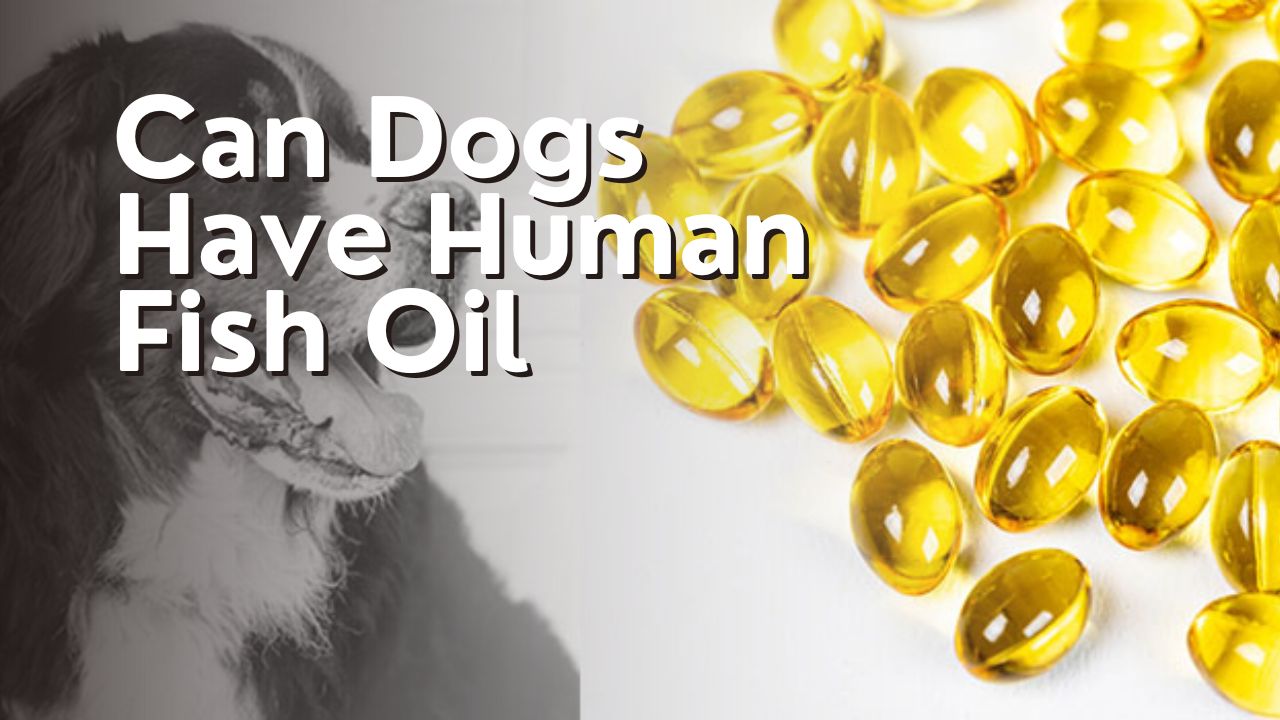Hey there! Have you ever wondered if dogs can benefit from taking human fish oil? Well, I’m here to give you the lowdown.
As a dog owner myself, I understand the importance of providing our furry friends with the best possible care. Fish oil is known to be rich in omega-3 fatty acids, which can have numerous health benefits for both humans and dogs alike.
But before you start sharing your fish oil capsules with Fido, there are a few things you need to know. In this article, we will explore the benefits of fish oil for dogs, the risks and considerations involved, and how to choose the right fish oil supplement for your four-legged companion.
So, let’s dive in and find out if dogs can really have human fish oil!
The Benefits of Fish Oil for Dogs
Dogs can definitely benefit from incorporating fish oil into their diet. Fish oil contains omega-3 fatty acids, which are essential for dogs’ health, just like they are for humans. These fatty acids help support a healthy coat and skin, reduce inflammation, and promote joint health.
One of the main benefits of fish oil for dogs is its ability to improve their skin and coat. The omega-3 fatty acids in fish oil help moisturize dry skin, reduce itching, and promote a shiny, lustrous coat. This is especially beneficial for dogs with allergies or skin conditions.
Fish oil can also help reduce inflammation in dogs, which is particularly important for older dogs or those suffering from arthritis. The anti-inflammatory properties of fish oil can help alleviate joint pain and improve mobility, allowing dogs to live a more comfortable and active life.
Furthermore, fish oil has been shown to support a healthy heart and brain function in dogs. The omega-3 fatty acids help reduce the risk of heart disease and support cognitive function, keeping dogs sharp and alert.
Incorporating fish oil into your dog’s diet can be as simple as adding a few drops to their food. However, it’s important to consult with your veterinarian to determine the appropriate dosage for your dog’s size and health condition.
Overall, fish oil is a great supplement that can contribute to your dog’s overall well-being and vitality.

Risks and Considerations
When it comes to giving your furry friend the same supplements you take, there are a few potential risks and important factors to consider.
While fish oil can be beneficial for dogs, it’s crucial to proceed with caution. One of the main concerns is the dosage. Dogs require different amounts of fish oil compared to humans, so it’s essential to consult with your veterinarian to determine the appropriate dosage for your pup.
Additionally, fish oil supplements for humans often contain additives and ingredients that may not be suitable for dogs. It’s crucial to choose a fish oil specifically formulated for dogs to ensure their safety and well-being.
Another consideration is the source of the fish oil. Some fish oils can contain high levels of mercury and other toxins, which can be harmful to dogs. It’s important to select a high-quality fish oil from a reputable source that undergoes rigorous testing for purity and safety.
Additionally, fish oil should not be used as a substitute for a balanced diet. While it can provide certain health benefits, it should be used as a supplement to a nutritious and balanced canine diet.
As with any supplement, it’s always best to consult with your veterinarian before introducing fish oil into your dog’s routine to ensure it is safe and appropriate for their individual needs.
Choosing the Right Fish Oil Supplement
Selecting the right fish oil supplement for your furry friend is crucial for their health and well-being. When choosing a supplement, there are a few factors to consider.
Quality is key. Look for a high-quality fish oil supplement sourced from wild-caught fish. These are typically more nutritious and free from contaminants.
Check the omega-3 content. The label should indicate the amount of EPA and DHA, as dogs require a specific ratio of these fatty acids. Ensure the supplement contains adequate levels of both.
Consider the formulation. Fish oil supplements come in liquid, capsule, and chewable forms. Choose the one that your dog is most likely to consume easily.
By considering these factors, you can select a safe and effective fish oil supplement that will benefit your dog’s overall health. Remember to consult with your veterinarian before adding any supplements to your dog’s diet to ensure it is appropriate for their specific needs.
Introducing Fish Oil into Your Dog’s Diet
To incorporate fish oil into your furry friend’s diet, it’s crucial to ensure they receive the best possible benefits for their overall health and well-being. When introducing fish oil into your dog’s diet, it’s important to start with small amounts and gradually increase the dosage over time. This allows their body to adjust and prevents any potential digestive issues.
One way to incorporate fish oil is by mixing it with your dog’s regular food. You can start by adding a small amount and gradually increase the dosage until you reach the recommended amount for their size and weight. Another option is to use fish oil capsules specifically made for dogs. These capsules can be easily hidden in your dog’s food or given as a treat.
It’s also important to choose a high-quality fish oil supplement that is specifically formulated for dogs. Look for a supplement that is derived from wild-caught fish and is free from any additives or fillers. The supplement should also have a high concentration of omega-3 fatty acids, which provide the most benefits for your dog’s health.
Remember, before making any changes to your dog’s diet, it’s always best to consult with your veterinarian. They can provide guidance on the proper dosage and help you choose the best fish oil supplement for your furry friend.
By introducing fish oil into your dog’s diet, you can help support their overall health and well-being.

Alternative Omega-3 Sources for Dogs
There are other options available to provide dogs with the beneficial omega-3 fatty acids they need for good health. While fish oil is a popular choice, there are alternative sources that can be just as effective.
One option is to include omega-3 rich foods in your dog’s diet. Foods such as salmon, sardines, and flaxseed are all great sources of this essential nutrient.
Another option is to use algae-based supplements specifically designed for dogs. These supplements contain the same omega-3 fatty acids found in fish oil, but without the fishy smell and taste. They are also a great alternative for dogs with allergies to fish.
Additionally, some dog food brands now include omega-3 fatty acids in their formulas, making it easier than ever to ensure your dog is getting the right amount. However, it is important to consult with your veterinarian before making any changes to your dog’s diet or adding supplements. They can provide guidance on the best options for your specific dog and ensure they are getting the right amount of omega-3 fatty acids for their health and well-being.
Frequently Asked Questions
Can fish oil supplements for dogs be used as a replacement for veterinary prescribed medications?
No, fish oil supplements for dogs should not be used as a replacement for veterinary prescribed medications. It is important to consult with a veterinarian for proper treatment and medication for your dog’s specific condition.
How long does it typically take to see the effects of fish oil supplementation in dogs?
It typically takes a few weeks to see the effects of fish oil supplementation in dogs. However, it’s important to note that using human fish oil for dogs is not recommended without consulting a veterinarian first.
Are there any specific dog breeds that should not be given fish oil supplements?
There are no specific dog breeds that should not be given fish oil supplements. However, it is always best to consult with a veterinarian before starting any supplements for your dog’s health.
Can fish oil cause any negative side effects in dogs?
Fish oil can cause negative side effects in dogs, such as diarrhea, vomiting, and a fishy odor. It’s essential to use fish oil specifically made for dogs, as human fish oil may contain harmful additives.
Is it safe to give fish oil supplements to pregnant or lactating dogs?
It is safe to give fish oil supplements to pregnant or lactating dogs. However, it is always best to consult with a veterinarian to ensure the proper dosage and to address any specific concerns.
Conclusion
In conclusion, I’ve learned that dogs can benefit from human fish oil supplements. It’s important to consult with a vet before introducing any new supplement. Choosing a high-quality fish oil supplement made for dogs is essential for their health. If you can’t give your dog fish oil, there are alternative sources of omega-3 fatty acids for their diet. Ultimately, providing your furry friend with necessary omega-3s can promote their well-being.


